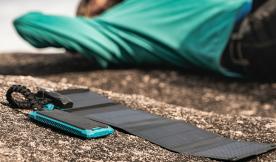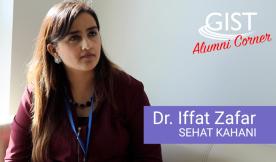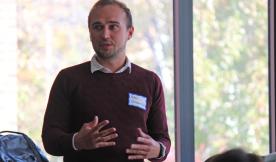How GIST-supported Environmental Startup is Solving the Plastics Pollution Problem
GIST Innovation Hubs (IHubs) help strengthen startup communities around the world. At IHub: FAB LAB Mindanao in the Philippines, environmental startup Lesstics brainstormed how they could help resolve the plastics recycling crisis facing their country. Co-founders Jessica Wu and Kenno Michael Uy took advantage of the IHub’s programs, mentorship, and makerspace to develop their innovative solution. Since their launch, they’ve won third place in the GIST APEC Pitch Competition in La Serena, Chile and presented at the United Nations Geneva Forum. Below, we hear from the co-founders on the steps they took to go from idea to internationally-recognized startup.
GIST: Jessica and Kenno, tell us about Lesstics. What was your journey from idea to startup?
Lesstics: The journey was very difficult, especially in the research and development phase. We had to rely on our own limited resources. Time constraints were also a factor as we had regular jobs to pay the bills and provide for our families. We did not receive support from our local government even though our technology is for the community we live in. Nobody believed in us except us until we won an award at the GIST APEC Catalyst Pitch Competition in 2019. We were then invited to present our technology in Geneva, Switzerland for the Geneva Convention in the United Nations. [Watch a clip of the team’s presentation at the Geneva Convention here.]
GIST: Can you tell us more about how you came up with the idea for Lesstics?
Lesstics: Lesstics, or Less Plastics, was conceived when we had our training at the FAB LAB Mindanao IHub. I realized that the school already banned single use plastic and yet I still saw a lot of plastic everywhere. I asked my co-founder who is a material engineer, “Why can’t we come up with a startup that will help solve this problem?” We started brainstorming until we came up with the idea that makes Lesstics unique from the others. We shred the plastic, then combine it with a proprietary, organic adhesive. We turn that material into molds for things like building insulators and boards.
GIST: What elements of the research and development phase were difficult?
Lesstics: What makes the research really difficult is looking for the right formulation that is affordable, available, and non-toxic. Using harmful chemicals to save the planet would be useless and testing materials for our formulation that are not readily available will be difficult in the long run. It was also hard to look for the right combination as the things we need can only be bought in bulk, which is impossible given our lack of finances. We needed to be creative and ask for samples from the companies that sell them. It was hard due to the unavailability of some components, the lack of equipment, and especially because it took us some time to get the right formulation.
GIST: Why is plastics recycling important to you, and how is Lesstics approaching this problem from a new angle?
Lesstics: Plastics, especially bags, are the biggest contributor to the problems we are currently facing not only in our city but all over the country. Landfills are exposing our citizens to possible health problems and leaking hazardous materials into our water sources. What makes us unique is that we made our own adhesive and patentable process to prevent melting the plastics, which causes more problems. The common practice from other companies is melting the plastics, causing a bigger problem as it releases toxic fumes in our environment, exposing the workers and the community to carcinogenic agents.
GIST: Why was plastics recycling important in your life?
Lesstics: Plastics recycling is very important as our city doesn’t collect garbage regularly. We also found out at that time that our landfill is already full and that the city is looking for another landfill to rent. We realized that if we could not come up with a solution for this problem, which is also experienced by the entire country, we will end up poisoning ourselves.
GIST: How was the GIST IHub a part of Lesstics’ journey? What did you gain from participating in their programs?
Lesstics: FAB LAB Mindanao was a big factor on how we came up with the idea. It is where we talked about the idea in one of the training sessions we attended. We asked for help from the expert mentors at FAB LAB and they were very much willing to work with us. FAB LAB has extended all the help they could so we could get more ideas, exposure, and come up with viable products.
GIST: Lesstics won third place in the 2019 GIST APEC Pitching competition. How did this award and GIST mentorship impact the company’s trajectory?
Lesstics: The prize money we won helped us to continue our research and development (raw materials and testing). Because of the exposure we received, we were able to present the technology to the United Nations, private companies, and local government units. Now we are waiting for commercialization as we already have a viable product.
GIST: Can you tell us about your experience at the Geneva Forum in December?
Lesstics: The Geneva Forum was a big boost for us as we have created more international connections. We realized that other countries are also facing the same problem. Now we are very sure of the direction of Lesstics: to help provide jobs and prevent single-use plastics from reaching our landfills and waterways.


